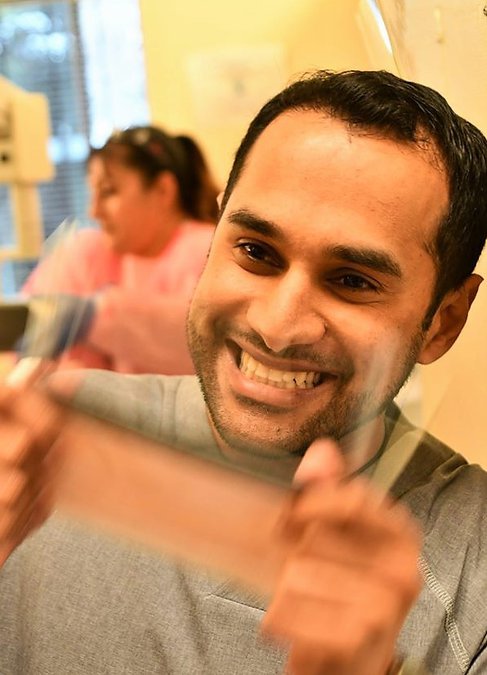Nabeel Cajee has been undergoing a different type of busy.
By that, he’s adapting to the new normal amid the COVID-19 pandemic.
The Manteca dental office of Nabeel and his brother Mas’ood Cajee at 132 Sycamore Ave., in accordance with the California Dental Association’s recommendation as well as those of state and federal agencies, was closed temporarily since March 17.
“We’ve stayed in contact with our patients and are available to them 24 / 7 and in case of emergencies,” he said on Monday. “We’re also doing staff training.
“When we reopen – however long from now – we will be doing our practice in a different manner.”
Another reason for closing his practice was due to the dire shortage of N95 respirator masks.
“This is what protects our team and patients,” Cajee said.
He’s in the beginning stage of developing Personal Protective Equipment such as respirator masks and face shields, using the same 3D printer in his practice for dental prosthetics and implant surgical guides.
“The masks I manufacture will be donated to our frontline healthcare workers and first responders in San Joaquin County,” said Cajee, who was featured in last Saturday’s 3D Heals Webinar on ‘Can 3D Printing Save Us from COVID-19 Crisis.’
He and Jenny Chen, who is the founder and CEO of 3D Heals, served as moderators during a numerous parallel conservation with the 3D printing healthcare sector consisting of Alan Dang (licensed orthopaedic spine surgeon and associate professor at UCSF), Judy Thomas (account executive for Origin, a manufacturer of an open platform solution for additive manufacturing), Adam Feinberg (co-founder of FluidForm), Firoza Kothari (co-founder of Anatomiz3D Medtech), and Lee Dockstader (director of Vertical Market Development of HP’s new 3D printer business), to name a few.
Cajee has been working on “pooling together the best design” for the respirator masks.
This includes securing material support from SprintRay – he received a loan of an advanced printer from this 3D manufacturer while purchasing filtration devices to place into 3D printed masks.
“Once all the pieces come together, we can begin a homegrown production of ventilator masks and get them to where they’re most needed,” said Cajee.
He believes that the community can do its part in limiting the spread of the coronavirus, including:
- Donate Personal Protective Equipment – In particular, respirator masks and other protective gear to frontline health care workers and first responders. Nabeel Cajee noted that there’s an effort by state and federal legislator calling for the community donations on PPE.
- Wear face covering, face cloth or mask in public – The initial opinion, he said, was to discourage individuals from wearing masks. However, mask-wearing in other countries proved helpful in limiting the spread of SARS-COV2 virus. For that reason, the Centers for Disease Control and Prevention, as of Friday, changed its guidelines, recommending that everyone wear a mask or face cloth when in public.
“We’ve learned that not every mask has to be a fancy respirator – even some protection is better than no protection. A mask at this time doesn’t just protect the individual wearing the mask. Wearing a mask or face cloth can also protect others especially those who may be infected,” Cajee said of the latter.
He added: “An infected person can go up to two weeks before he or she shows any symptoms.”





